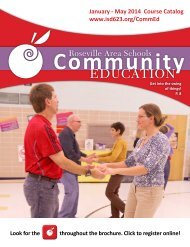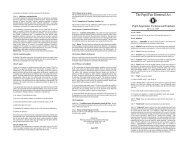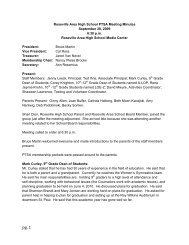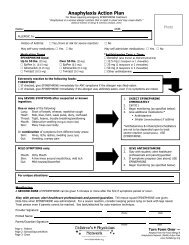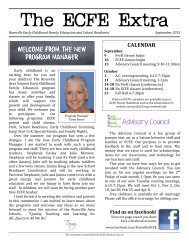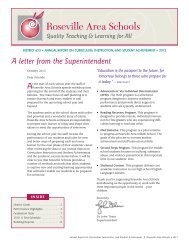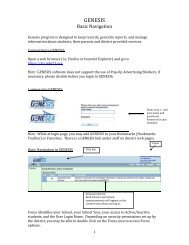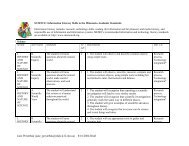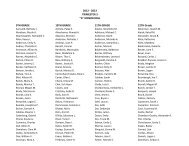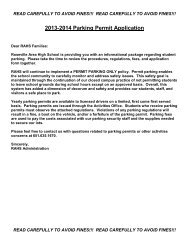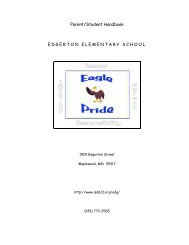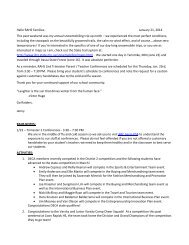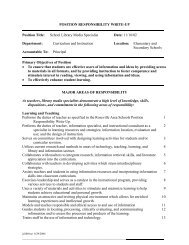Roseville Area Schools Local Literacy Plan for Reading Well by ...
Roseville Area Schools Local Literacy Plan for Reading Well by ...
Roseville Area Schools Local Literacy Plan for Reading Well by ...
Create successful ePaper yourself
Turn your PDF publications into a flip-book with our unique Google optimized e-Paper software.
Also, training frequently happens as en embedded part of regular school activity. For example,<br />
each school has developed its own schedule that allows teams to plan and write Collaborative<br />
Intervention <strong>Plan</strong>s, as well as monitoring those plans across the year. These meetings are very<br />
often facilitated <strong>by</strong> a reading specialist or district coordinator with expertise in developing<br />
reading support. Consequently, training occurs as part of the planning process. Over the four<br />
year period of professional development described above, each school has embedded districtlevel<br />
training into regular, ongoing meeting schedules so that processes and training are<br />
integrated.<br />
A good research base exists supporting this professional development and the structures and<br />
supports we have created in recent years. A good starting place <strong>for</strong> readers of this report less<br />
familiar with the research is the RTI Action Network (www.rtinetwork.org), which provides links<br />
to studies and summary findings.<br />
Explain how training and support will be provided so that all district elementary teachers can<br />
effectively recognize students’ diverse needs in cross-cultural settings and serve the oral<br />
language and linguistic needs of EL students<br />
The <strong>Roseville</strong> <strong>Area</strong> <strong>Schools</strong> utilize a number of resources and methods <strong>for</strong> the continued growth<br />
of our staff related to the unique instructional needs related to our English Learners. The<br />
method of staff development takes two <strong>for</strong>ms <strong>for</strong> K-3 staff related to reading staff development.<br />
The first method of staff development is combined large group training on the reading process.<br />
Over the course of the past two school years, the EL teachers have worked as partners and coteachers<br />
in the domain of reading. These trainings have focused on the five elements of<br />
reading (phonemic awareness, phonics, fluency, vocabulary, comprehension) and direct<br />
instruction, which supports growth in these areas. The second method of training consists of<br />
staff development of classroom teachers related to WIDA standards in the language domains<br />
(<strong>Reading</strong>, Speaking, Listening, and Writing). One application of this implementation <strong>for</strong> staff<br />
development is the consistent use of Can Do descriptors <strong>by</strong> all K-3 education staff. These Can<br />
Do Descriptors encourage common professional language related to increasing student<br />
proficiency through aligned staff ef<strong>for</strong>t.<br />
A second layer of the staff development <strong>for</strong> all instructional staff related to the needs of English<br />
Learners is training on methods of instructional delivery. Two common methods of instructional<br />
delivery are used in our district with K-3 students and staff; pull-out EL instruction and coteaching.<br />
The staff development <strong>for</strong> pull-out instruction rests primarily with the licensed EL<br />
teacher. Staff development outcomes <strong>for</strong> this method rest primarily in communication of<br />
instructional outcomes and progress. The second method of instruction is much more staff<br />
development focused with the classroom and reading teachers. All buildings and staff<br />
implementing co-teaching methods will have targeted staff development and planning time<br />
related to the unique <strong>for</strong>ms that this type of EL instruction can take in a school.<br />
District-wide professional development in the areas of equity mindset and equity skillset work<br />
complement the more EL-specific types of training described above. Equity mindset training<br />
refers to the teacher beliefs, dispositions, and orientations that are most associated with<br />
reductions in the achievement gap. Equity skillset work refers to the learning of new techniques<br />
and instructional strategies that reduce the achievement gap. All teachers participate in both<br />
mindset and skillset sessions across the school year. Currently, district professional



